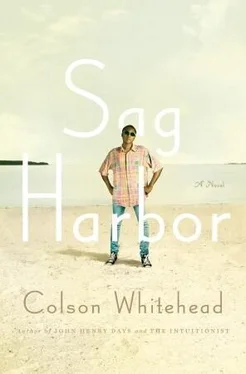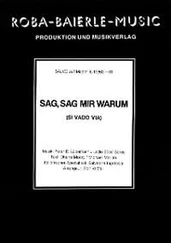The Minnow meant that I'd reached the Public Beach, another neglected haunt, although this was to change next year when we started getting high in the parking lot, in Bobby's car. The Public Beach — which was open to all of Sag Harbor, i.e., the white people — was now key in that it provided the second half of the shortcut to town, to work. The commute to Jonni Waffle, indeed everything Jonni Waffle — related, occupied such prime real estate in my brain that I had even stopped having swimming-lesson flashbacks when I got to the Public Beach. Quite a feat, given the tormenting echoes of my failure and their reverberations through the years. The ghostly phrases—“Blow out your nose!” “Now float!” “Let go of my arm, goddamnit!”—were just a whisper, barely audible over the tide. Swimming Instructor, Prison Camp Guard. It was my first lesson in true uselessness. Guppy, Snapper, Shark — I can't remember the specific benchmarks because I never reached them. I was left back three years in a row, the tallest Guppy on the beach, looming over the little kids like a gawky monument to ineptitude, whereupon my mother washed her hands of me. A Sag Harbor Baby was someone who had been coming out here since birth, like my mother, like Reggie and me, like those kids I had just passed on Azurest Beach. A Sag Harbor Baby who couldn't swim was a shame on the whole community, a deficiency in that area being a widely recognized predictor of later deviancy Red Tompkins, for example, was a notorious nonswimmer, and we all know how he ended up despite all the advantages. Glug glug.
I walked through the parking lot and up the road, splitting off to hit the last leg of the shortcut, a shunt of woods that let out on Bay Street. There's a house there nowadays, so you have to take the long way around. I've retraced my old routes to make sure what I know is plausible in the retelling, and to give a sporting chance to the Forgotten and the Repressed, those two overlooked cousins of ours there in the corner avoiding eye contact. (Chime in whenever, guys.) The house is cool, stark-angled, a gray gargoyle of hip, and I like it even though it doesn't fit in with the rest of the houses on Bay Street, the Dutch colonials with long capacious porches, the Gothic revival abodes, inevitably festooned with red-white-and-blue bunting come July Fourth. The last time I visited, the new house had a plastic playground set in the yard, which seemed odd, because the public beach's playground was so close. But then kids don't play out there like we used to.
The shortcut slingshotted us into White Sag Harbor and had the bonus of zipping us past the house on the corner of Bay and Hemp-stead, where a pack of dogs, pampered Labs and well-brushed spaniels, always burst out from under the porch to taunt and snarl at the passersby It also took us past the shabby green house where the pickup truck with the Confederate-flag bumper sticker parked, forcing us to say “Fuckin' rednecks” whenever we passed it. Over the years, the “Fuckin' rednecks” tally really piled up. We were sick of saying it and sick of seeing the truck every summer.
Round the bend, past High Street, and I was practically in town. I passed the Cormaria Retreat House, known in our neck as the Nunnery. Per custom, I paused for a minute to picture what went on at the end of the driveway, generally intimations of lesbian love. Informed by late-night cable flicks, my imagery that summer featured wispy young women who cavorted in nighties, holding candlesticks in the moonlight and giggling as they chased each other across the grounds. The scenes generally ended up with a lot of petting, with roommates saying, “You be the boy and I'll be the girl and we'll practice kissing open-mouthed.”
I reached the sleepy marina, home port in those days for small motorboats, secondhand Chris-Crafts, fishermen's specials with Budweiser in the cooler, and the odd swanlike sailboat, resting in our humble cove between excursions. Occasionally someone's sleek cigarette boat, straight out of Miami Vice . The bigger boats were rare, but it was already starting, the migration of the boors, as the marinas of the Hamptons filled up berth by berth and the rich people on the other side of the island discovered Sag Harbor as a place to moor their extravagantly gaudy yachts.
It had been a long time since Sag Harbor got its start as a shipping port, first as a conduit for goods from the Atlantic and Long Island to Connecticut — lumber, food — then hitting its stride during the whaling boom. Hard to imagine the ships that used to drop anchor there. The town is mentioned in Moby-Dick —it's a Sag Harbor ship that takes Queequeg from his South Sea home to America. Perhaps you've heard how that turned out for him. Even his no-doubt Shark-level swimming skills couldn't save him from his fate. I'll point out that Queequeg had a bit of double consciousness about him, to embroider a theme: “And thus an old idolator at heart, he yet lived among these Christians, wore their clothes, and tried to talk their gibberish. Hence the queer ways about him, though now some time from home.”
It must have been quite a sight, sleepy Bay Street swarming with the antic commerce of the whale trade — cockeyed captains harrumphing down the gangplanks of assorted schooners and great ships, salty dogs of all shape and temperament and color dragging harpoons, humming the latest sea shanty, and generally roiling about where what is now orderly sidewalk, tamed grass. As I begin to describe the kind of work I used to do in Sag Harbor, the scooper's trade, I try to picture what things were like one-hundred-fifty years earlier, and of course it's dim. All I can muster, truly, is an image of the black sailors trudging home at the end of the day to Eastville, the direction I had just come from. I tipped my hat to ghosts as we passed each other.
At the stoplight, Bay Street ended and I had a choice. Turn left, toward the Corner Bar, or turn right, onto the Long Wharf. I turned right. The wharf has more than enough to keep us occupied, especially on warm summer days like the one in question. I was on my way to work, and it was the Long Wharf that Jonni Waffle called home.
The Long Wharf was the main drag during the whaling days.
Now it served a different trade — tourism and leisure, although given national statistics on obesity, blubber still had its niche. Bayside, the discotheque anchoring the wharf, was a new Hamptons beachhead for partying New Yorkers. Their concerts featured big pop names and the regular club nights generated crowds and traffic of a kind the town had never seen before. There was no going back. Adjacent to Bayside was the Long Wharf Promenade, a warren of well-hexed seasonal shops that never lasted long. Antiques stores collecting sixty years of lapses in taste vis-à-vis summer-home decoration. Bright and shiny preppie clothing stores selling weird things like pre-tied sweaters — sweaters that could not be worn in the conventional fashion as they were in fact fat cotton necklaces, meant to rest on the shoulders in immaculate WASP style. A comic-book store came and went, and a video store. The manager of a cigar shop incorrectly calculated the rate of Hamptonization — the body of scientific lore on this subject was still small — and his establishment quickly disappeared. The only survivor, and it is there to this day, was Jonni Waffle.
The Long Wharf Restaurant rounded things out, providing overpriced American fare in exchange for the view. Any spot on the wharf specialized in the picturesque and dared you to dislike it. A lithe bridge arced over to North Haven, and a replica of a windmill, festooned with a historic plaque or two, provided a handy Polaroid spot. Shelter Island brooded across the water, dumb and stoic. The restaurant overlooked the marina, and this was before big yachts took over the east side of the wharf, so there were still plenty of spots for fishermen to drop red-and-white bobbers over the side, their catch flailing in the buckets at their feet. The tiny fish you got off the wharf — snappers, porgies — was a parody of the old trade, but tasty when fried in a skillet.
Читать дальше












